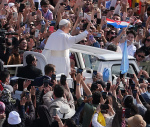You are here
After meeting with Trump, Al-Sharaa’s real test begins now
May 18,2025 - Last updated at May 18,2025
The real test for Syria’s transitional president, Ahmad Al-Sharaa, began the moment he returned from Riyadh following his meeting with U.S. President Donald Trump. The high-level meeting in the Saudi capital also succeeded in persuading the U.S. to suspend sanctions on Syria, granting Al-Sharaa's interim administration its most critical and powerful tool for navigating the next phase of governance.
President Trump’s use of the phrase “sanctions cessation” implies that this isn’t yet permanent, but rather conditional on progress on the ground. For Al-Sharaa, this marks the beginning of a mission to demonstrate leadership and the capacity to manage Syria’s deeply complex political, security, and economic issues. It is, effectively, his opportunity to demonstrate his political credentials to the international community and prove he is more than a temporary figurehead.
Internally, one of Al-Sharaa’s most pressing challenges lies in forging political consensus among Syria’s fractured social and ethnic components. A new compact must emerge, one that ensures regional autonomy and protects the integrity of each group’s identity. In particular, he must give the Kurds a central role in the fight against ISIS and take responsibility for the detention facilities housing captured fighters. If Al-Sharaa succeeds in creating a functional internal political framework, he may secure a lasting foundation for national stability.
However, the regional dimension may prove even more decisive. Syria’s future hinges on its relationship with Israel, a reality many within the region acknowledge but few are willing to confront publicly. Any escalation or direct Israeli military action in southern Syria could collapse the interim government and plunge the country into renewed chaos. For this reason, Al-Sharaa may have little choice but to accept the facts on the ground: Israel’s de facto control over the Golan Heights, the presence of a demilitarized buffer zone, and Israel’s strategic determination to eliminate any logistical use of Syrian territory by hostile actors. These are non-negotiable from the Israeli perspective, born of a deep mistrust and shaped by years of perceived threats from within Syrian borders.
According to multiple US officials, ongoing American-Israeli discussions with Al-Sharaa’s team may lay the groundwork for broader normalization agreements, possibly leading to Syria joining the Abraham Accords. But any such step would likely be preceded by symbolic gestures to build trust, such as the return of Israeli soldier remains or the repatriation of Eli Cohen’s body, long reported to be buried in Syria.
Still, Syria’s most volatile challenge remains domestic security. The proliferation of armed groups, including factions previously affiliated with Hay’at Tahrir al-Sham, pose a serious threat to stability. Many of these fighters do not share the ideological shift from the leadership of Abu Mohammad al-Jolani to that of Al-Sharaa and may resist or rebel against the transitional authority. In addition, the presence of foreign militants, who technically fall under the current security framework but often act independently, adds another layer of danger. They have repeatedly demonstrated that they are uncontrollable and resistant to any effort to integrate them into a state-based structure.
Furthermore, the threat of ISIS has by no means dissipated. The group has expanded its operations in Syria’s vast desert areas and continues to launch high-profile attacks. The fear now is not only ISIS’s operational resurgence but its potential to attract defectors from Al-Sharaa’s own security apparatus. especially those who reject the state-building narrative and feel directly threatened by the shift from militancy to governance.
If Al-Sharaa succeeds in confronting ISIS effectively, in coordination with the international coalition, he could gain significant credibility as a counterterrorism partner. That success might become his strongest international credential, proving that he is not merely a political placeholder but a viable actor on the ground.
The US, having granted Syria temporary sanctions relief, is now watching closely. It expects results, tangible achievements that show Syria is moving toward a new phase. The path ahead spans three interlinked fronts: internal political reconciliation, comprehensive domestic security reform, and a recalibrated regional policy, particularly regarding Israel. Only by advancing on all three fronts can Syria’s interim leadership hope to transition from a fragile experiment into a sustainable state project.













Add new comment